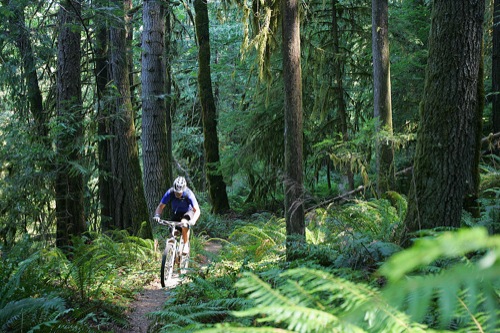 BY SOPHIA BENNETT
BY SOPHIA BENNETT
There is one bright spot in Oakridge’s economy: tourism, specifically its growing reputation as a major destination for mountain biking.
 |
| Mountain biking in the Willamette National Forest // Photo by Chad Sagser |
BY SOPHIA BENNETT
Oakridge’s story reads like so many other Oregon towns. For 40 years the Pope and Talbot lumber mill was the major employer in the small community 40 miles east of Eugene. Its closure in the 1980s devastated the local economy.
What came next is also familiar. What Oakridge needed, community leaders promised, was another major employer who would bring high-paying jobs with benefits to anyone who wanted one. To that end, the city bought the old mill site and spent 10 years preparing it for their anticipated savior.
But nearly 30 years after the mill’s closure, the city’s efforts have seen lots of failures and no lasting successes. “We’re making an aggressive effort to bring jobs to this community,” says John Milandin, the volunteer chairperson of the Oakridge Economic Development Advisory Committee. “In the long run it’s going to pay off, but it’s certainly a tough job.”
Plenty of businesses have inquired about setting up in Oakridge, but few have followed through. The ones that have, such as a cement shingle manufacturer and a small diameter sawmill, couldn’t find markets for their products and closed down. The average occupancy rate at the Oakridge Industrial Park, since it was certified shovel ready in 2007, is 30%.
There is one bright spot in Oakridge’s economy: tourism, specifically its growing reputation as a major destination for mountain biking. The surrounding Willamette National Forest boasts more than 500 miles of trails through old-growth forests and alpine meadows. The sport has proved so popular that the city recently rebranded itself the “Mountain Biking Capital of the Northwest.”
“I always say mountain biking isn’t going to save Oakridge, but it’s got the biggest economic impact in this town,” says Randy Dreiling, owner of Oregon Adventures and promoter of the popular Mountain Bike Oregon festival. “If we didn’t have tourism, we wouldn’t have as many employed and we wouldn’t have new businesses coming here.”
One of those businesses is Brewers Union Local 180, a traditional Anglican pub located in the uptown district. Ted Sobel, the publican and brewer, managed to hold on through the economic recession largely because of the influx of tourists. “Mountain bikers generally like beer, so they come to the pub when they’re in town,” he says. Small business definitely has a place in reinventing Oakridge’s economy, Sobel believes. “But you have to have someone with a vision who does something different. You can’t just slap something together.” Lion Mountain Bakery and the Willamette Mountain Mercantile, which rents, sells and repairs bicycles, are two examples.
Dreiling believes Oakridge will follow the model of small Oregon communities like Prineville and The Dalles, which attracted Facebook and Google, respectively, with the promise of outdoor recreation for employees and lower costs for businesses. Prineville is a haven for rock and fossil hunters, and The Dalles boasts the Columbia River. If Oakridge can build a reputation for mountain biking, it may have a shot at attracting a similar company. If business leaders are successful, they may demonstrate that selling quality of life in rural communities is a model, not a fluke.
Still, the days of a major employer driving the local economy may be over. “What’s going to make a difference up here is smaller businesses employing smaller numbers of people,” Dreiling says. “If you could come up with a couple hundred jobs, that would be huge.”
Mountain Bike Oregon, a three-day bike festival, brought $1.2 million into the Oakridge economy in 2012. Mountain bikers also spend an average of four days in communities they visit, giving them ample opportunities to patronize local businesses. SOURCE: DR. JEFF MCNAMEE, Linfield College
“Oakridge has an industrial park that’s shovel ready. The community has what it needs to support population growth. It’s a good place for families. You’ve got to prepare the fabric of a community, make people feel safe and secure in their environment. If you do that, you will attract businesses and they will grow.” —JOHN MILANDIN, Oakridge Economic Development Advisory Committee
“I don’t believe in the chasing smokestacks theory. I’ve seen too many businesses come and go. I think it’s going to be smaller businesses employing people. I think what’s going to happen is people will come here to recreate, and they’re going to move here for the quality of life.” —RANDY DREILING, Oregon Adventures



